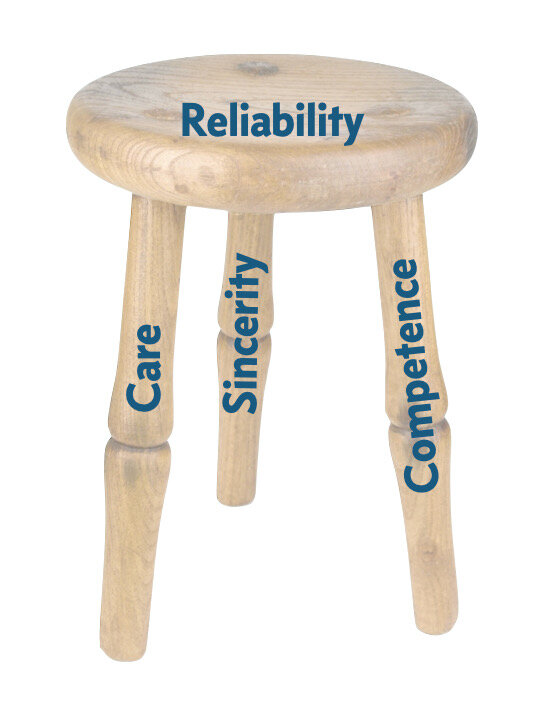Leadership in Focus (Issue 3)
“Don’t you trust me?” If someone has ever posed that question to you, besides making you a bit uncomfortable, it might have been difficult to answer. Trust is complicated.
The assessment of trust has many facets. Here are four trust distinctions as identified by Charles Feltman in his great little book The Thin Book of Trust.
- Care
- “He wants what's best for me.”
- Sincerity
- “She says what she means and means what she says.”
- Competence
- “The have the knowledge and skills to do what they say they will do.”
- Reliability
- “They keep their promises.”
Trust is an assessment that can be made of an individual, group, company, or government—any entity with which you have a relationship. You can imagine these four trust distinctions like the parts of a stool. If one piece is missing or weak, the overall assessment of trust will be affected.

Now it is certainly possible for you to make an assessment of someone’s trustworthiness with one of those distinctions and reach a different conclusion for a different one. For example, while I have one hundred percent confidence that my wife wants what is best for me (care), if I need a surgical procedure in the future, I will go to a qualified professional (competence). In other words, there is no such thing as a blanket trust assessment. It’s more nuanced than that.
Consider how trust (or the lack of it) affects your work. If you have a large amount of trust in a colleague in all of those trust distinctions, your work together will proceed faster, more efficiently, and with a greater likelihood of success. By contrast, think about all the extra emails you send and meetings you need to schedule when you do not believe a colleague has the competence to complete a task to the accepted standard. The business writer Stephen M.R. Covey describes these two scenarios as a “trust dividend” and a “trust tax.” When it comes to your relationships (personal or professional), low trust carries a high cost.
From now on, try using these four trust distinctions to add some nuance to your trust assessments rather than making it an all or nothing proposition. The extra precision will help you make better decisions. I will take some time in a future newsletter to begin to address how to start rebuilding trust when it has broken down.
A thought to ponder #
Whoever is careless with the trust in small matters cannot be trusted with important matters.
Something Delightful #
Some people and cultures are capable of taking a long view. In the West, our appetite for instant gratification makes taking decades to plant and tend “living bridges” seem almost unthinkable. I think there’s something to learn here.